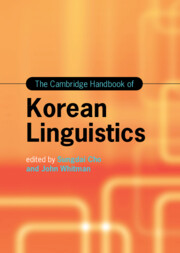Book contents
- The Cambridge Handbook of Korean Linguistics
- Cambridge Handbooks in Language and Linguistics
- The Cambridge Handbook of Korean Linguistics
- Copyright page
- Contents
- Figures
- Tables
- Contributors
- Preface
- Acknowledgments
- Abbreviations
- Part I Korean Overview
- Part II Phonetics and Phonology
- Part III Morphology and Syntax
- Part IV Semantics and Pragmatics
- Part V Sociolinguistics and Psycholinguistics
- Part VI Language Pedagogy
- Chapter 26 The Genre-Based Approach to Korean Language Teaching: A Curriculum Application
- Chapter 27 Towards Integrated Performance Assessment
- Chapter 28 Interactional Competence in the Korean Language
- Chapter 29 From Bilingual Speakers to Korean Heritage Language Learners
- Chapter 30 Language Policy and Its Effect in South Korea
- Index
- References
Chapter 30 - Language Policy and Its Effect in South Korea
from Part VI - Language Pedagogy
Published online by Cambridge University Press: 30 September 2022
- The Cambridge Handbook of Korean Linguistics
- Cambridge Handbooks in Language and Linguistics
- The Cambridge Handbook of Korean Linguistics
- Copyright page
- Contents
- Figures
- Tables
- Contributors
- Preface
- Acknowledgments
- Abbreviations
- Part I Korean Overview
- Part II Phonetics and Phonology
- Part III Morphology and Syntax
- Part IV Semantics and Pragmatics
- Part V Sociolinguistics and Psycholinguistics
- Part VI Language Pedagogy
- Chapter 26 The Genre-Based Approach to Korean Language Teaching: A Curriculum Application
- Chapter 27 Towards Integrated Performance Assessment
- Chapter 28 Interactional Competence in the Korean Language
- Chapter 29 From Bilingual Speakers to Korean Heritage Language Learners
- Chapter 30 Language Policy and Its Effect in South Korea
- Index
- References
Summary
Chapter 30 investigates how Korean language education in the Republic of Korea (ROK) has influenced national development. The chapter argues that Korean language education in the ROK has directly and indirectly contributed to the establishment of national linguistic legitimacy. Reminding citizens of their personal and national identity, the notion of identity is associated with patriotism. Morality translates into moralism as it promotes the ethicality of individuals and the state. The chapter reviews developments such as the Hang?l writing revolution associated with King Sejong in the fifteenth century, the stylistic revolution associated the Korean language promotion movement led by Sigyeong Ju and the Chos?n Language Society, and the educational revolution in South Korea.
Keywords
- Type
- Chapter
- Information
- The Cambridge Handbook of Korean Linguistics , pp. 849 - 875Publisher: Cambridge University PressPrint publication year: 2022

